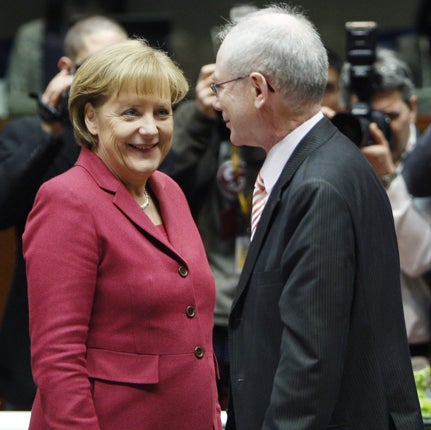Merkel hints at new vote on EU treaty
Greek bail-out puts case for new economic rulebook, warns German leader

Your support helps us to tell the story
From reproductive rights to climate change to Big Tech, The Independent is on the ground when the story is developing. Whether it's investigating the financials of Elon Musk's pro-Trump PAC or producing our latest documentary, 'The A Word', which shines a light on the American women fighting for reproductive rights, we know how important it is to parse out the facts from the messaging.
At such a critical moment in US history, we need reporters on the ground. Your donation allows us to keep sending journalists to speak to both sides of the story.
The Independent is trusted by Americans across the entire political spectrum. And unlike many other quality news outlets, we choose not to lock Americans out of our reporting and analysis with paywalls. We believe quality journalism should be available to everyone, paid for by those who can afford it.
Your support makes all the difference.Angela Merkel has risked angering leaders across Europe after backing major constitutional changes to the EU designed to prevent another Greek-style crisis for the Euro.
European leaders all claimed to be satisfied as they headed home from their latest summit having agreed a €22bn emergency rescue package for Greece. But before leaving, the German Chancellor floated the possibility of altering the EU treaty, a prospect that will fill many governments with dread.
It is only six months since the ratification of the Lisbon Treaty, when leaders vowed they would not go through the bruising process of signing off another major constitutional document for a decade.
Any attempt to reopen the turtuous process would be a nightmare scenario for leaders, including Gordon Brown. It would also cause a major headache for David Cameron, the Conservative leader, for whom the issue of Europe has caused deep rifts within his own party.
But Ms Merkel, who is keen to introduce a new European economic rulebook to head off another Greek-style crisis, said such a major reform would require alterations to the Maastricht Treaty, which forbids bail-outs for eurozone members.
While she said it should not be assumed that a new document would have to be agreed among the 27 states, she added it was her view that "we won't be able to avoid treaty change".
"I know how exhausting the Lisbon Treaty was to negotiate," she said. "The EU must stay dynamic enough, so that when it's necessary and clear that the existing treaties are no longer enough, we don't say we didn't want to change anything." She said the EU should not "put up with something that's not good enough instead of doing something about it".
A taskforce has now been set up to look into how to tighten up the rules, with "all options" on the table. It will present its proposals by the end of the year. Chancellor Merkel is keen on the creation of a European Monetary Fund (EMF), a significant body that would almost certainly need treaty alterations to set up.
EU sources suggested she had pushed for the European Council to signal support for even tougher measures against countries mismanaging their economies, even including exclusion from the euro.
"There have to be some systematic changes, we can't just pretend this is just a one-off," Chancellor Merkel said. "I haven't been elected so that in ten years time we're here again, saying we didn't think this would happen. That's why we need to stop and think about what should be consequences of this."
Both Gordon Brown and the French President, Nicolas Sarkozy, quickly tried to play down fears of another lengthy treaty battle.
Mr Brown has already told parliament that he would not back any major reforms for two parliaments. The Greece deal was "a sensible set of proposals about how we can improve the procedures of the European Union without institutional or constitutional changes".
Join our commenting forum
Join thought-provoking conversations, follow other Independent readers and see their replies
Comments